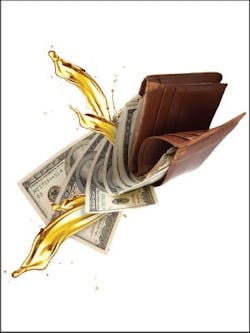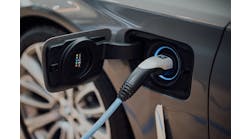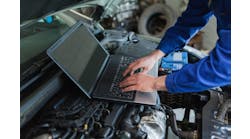New automotive technologies are allowing cars to last longer and run more smoothly with less maintenance and fewer repairs, says Ruff Heimerich, spokesperson for the California Department of Consumer Affairs. One of those improvements includes fluid systems. New detergent additives have boosted longevity and, in some cases, reduced the need for regular flushes and exchanges.
Although those advances are beneficial, it’s sparked debate within the auto repair industry—specifically, how often fluid system services should be performed in modern vehicles.
Heimerich says many auto manufacturers have either reduced recommendations for the frequency when certain fluid system flushes and exchanges should be performed, or no longer recommend certain services to be performed altogether. Meanwhile, repair professionals still see fluid services as important maintenance processes to lengthen vehicle lives, and continue to recommend those services to customers.
The varied opinions have generated concern among California consumers, Heimerich says. They fear that repair shops have ripped them off by recommending fluid services that are unnecessary and not recommended in the owner’s manual.
Commonly referred to as “wallet flushing,” it’s a trend that the California Bureau of Automotive Repair (CBAR) recently investigated. And it’s become a prominent issue that repair professionals believe could damage consumer perceptions of the independent repair industry, and change the way shops recommend fluid maintenance—including engine oil, transmission, power steering, fuel injection, induction cleaning, cooling system, differential, brakes and air conditioning—to avoid a potentially detrimental penalty.
Defining a
“Wallet Flush”
False claims of vehicle benefits, such as improved emissionor gas mileage performance.
Misrepresentations of actual vehicle system condition.
Failure to tell the customer the services are not recommended by the manufacturer.
Failure to describe all aspects of service so consumers can understand the parts and labor purchased, or disclose that the flush is being performed as part of a service package.
False advertisements, including the use of a vehicle manufacturer logo.
Currently, the “wallet-flush” issue is only a prominent concern in California. But that doesn’t mean it will stop there, says John Denholm, government affairs committee chair for the Automotive Oil Change Association. CBAR has highly publicized the issue through development of a public awareness campaign, which could set precedent for other U.S. states to take a look at it, too.
A Real Problem
CBAR’s investigation of the “wallet-flush” issue was initiated following a spike in consumer complaints. Heimerich says several consumers complained about being mislead over the need for various fluid system services, claiming that shops had taken advantage of them.
Upon investigation, Heimerich says “multiple repair facilities” were identified that charged for unnecessary fluid services based on untruthful claims. He says shops sold services that either provided no benefit to the customer, or that were based on misleading information without disclosure of all the facts.
Shops told customers that the auto manufacturer recommends a certain service or that the vehicle could lose its warranty without having the maintenance—both of which are untrue, Heimerich says.
Shop Impact
Rick Norton, president of Precision Automotive Repair in Sacramento, Calif., says his biggest concern is that consumers will no longer trust his professional advice. He says CBAR is pushing for consumers to only trust information in their owner’s manuals, not recommendations made by industry professionals.
“This issue is bad for the repair industry because it sets us in a light where people think we’re out to defraud customers and empty their wallets. But we’re doing nothing of the sort; that’s not our goal,” Norton says.
Norton agrees that auto fluids require less maintenance compared to the past, but that doesn’t mean those services are unnecessary altogether.
Toyota, for example, has developed a life-long transmission fluid for its Prius model that the company recommends never changing in the owner’s manual. But Norton says he’s seen several Priuses with dirty, contaminated and discolored fluid that needs to be changed to maximize the life of the vehicle.
“Although it takes a long time for transmission and power steering fluid to get dirty in new cars, it still happens,” Norton says.
Sell It Right
Johan Gallo, president of the California Automotive Business Coalition, says there is concern that the “wallet-flush” issue could make some shops apprehensive and cause them to eliminate these service offerings altogether.
“It definitely could cause shops to take another look and assess whether they even want to do this type of service if it’s going to be this controversial,” Gallo says. And that could have revenue impact on shops, as fluid services tend to be relatively simple processes with high profit margins.
Heimerich says fluid system services are still fully acceptable for shops to sell. The organization knows fluid services are important to supplement income for auto repair facilities. CBAR isn’t concerned about what services are sold, but rather how they are sold. In other words, he says shops have to be open, honest and truthful when selling any fluid service.
“Shops can’t tell consumers that the manufacturer recommends something if that’s not true. And if the manufacturer does recommend something, shops must be able to show customers exactly where that recommendation is made,” Heimerich says. “Shops need to be more conscientious about how they sell. They need to stick to the facts.”
The biggest takeaway for shops is to learn to sell fluid system services appropriately, Gallo says. They need to understand how to educate consumers on service recommendations to avoid being construed as a “wallet flush.” If shops are recommending fluid services that aren’t listed in the owner’s manual, they need to present the consumer with a clear and thorough explanation regarding the basis of the recommendation.
Norton doesn’t think this will prevent him from recommending fluid system services like he always has. But it will cause his staff to sell services in an advisory and educational manner.
Norton’s staff clearly explains why a certain service is needed based on discoloration or contamination, and describes the various problems that can cause in the vehicle. He never tells customers that a fluid service is “due” to be changed, or that it needs to be done based on OEM information because that’s not true in many situations.
“We’re very careful about how we word this. It’s about educating the customer on how their vehicle works, and what keeps it running,” Norton says. “If you can intelligently discuss your recommendations to explain the need for certain services, you should be OK. You have to run an ethical business and serve customers the right way for the right reasons.”
Enforcement
Following CBAR’s investigation, Heimerich says the industry made an effort to curb the problem. CBAR elected not to pursue any specific laws or regulations due to the industry’s good faith effort to reduce complaints.
But CBAR still carries cite and fine authority over California repair shops, and it’s something the organization will keep top of mind and enforce when necessary. Heimerich says “wallet-flush” investigations will be complaint-driven, and performed when consumers report unfair business practices by shops.
He says the penalties will vary depending on the circumstances. CBAR will investigate whether a violation was an isolated incident, or if the repair facility has a “repeated pattern of deceiving and defrauding customers.” In egregious situations, Heimerich says the penalty could be as severe as business license suspension or revocation.



